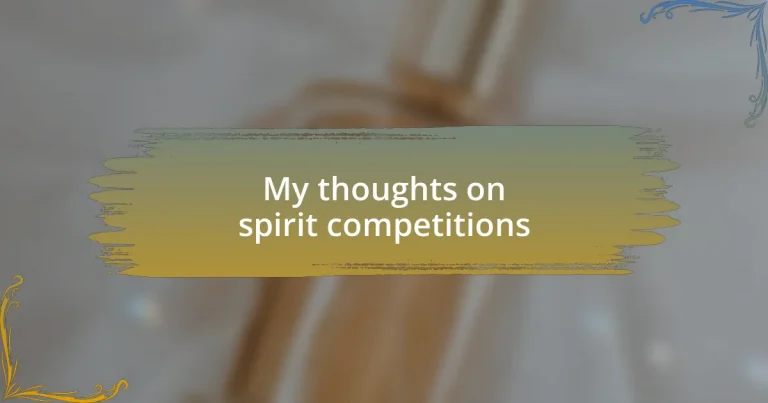Key takeaways:
- Spirit competitions showcase exceptional distilled beverages and influence consumer choices, often transforming a distillery’s visibility and success through awards.
- Judging is conducted by experienced panels using blind tasting methods that focus on the intrinsic qualities of spirits, allowing hidden gems to emerge.
- These events foster community among distillers, providing a collaborative environment for innovation and shared experiences.
- Personal connections and memories associated with tasting spirits enrich the overall appreciation of their complexity and craftsmanship.
Author: Clara Whitmore
Bio: Clara Whitmore is an acclaimed author and storyteller known for her captivating narratives and richly drawn characters. Her work spans several genres, including contemporary fiction and historical romance, often weaving elements of personal experience into her writing. Clara holds a Master’s degree in Creative Writing from the University of Edinburgh and has published three novels, which have garnered critical acclaim and a loyal readership. When she’s not writing, Clara enjoys exploring quaint bookstores and hosting literary workshops. She currently resides in Portland, Oregon, with her dog, Jasper.
Introduction to spirit competitions
Spirit competitions play a pivotal role in the world of distilled beverages, showcasing the finest alcohols from around the globe. I remember the first time I attended one; the atmosphere was buzzing with excitement as I sampled a diverse array of spirits, each telling a unique story through its flavor and craftsmanship. Have you ever tasted something that took you on a journey? That’s precisely what these events offer.
At these competitions, experts and enthusiasts alike come together, judging spirits based on criteria like aroma, taste, and finish. I’ve witnessed how a single bottle, when awarded a medal, can catapult a brand into the public eye, creating a whirlwind of popularity and demand. It’s fascinating to consider how the opinions of a few can shift the trajectory of an entire distillery’s future.
Moreover, spirit competitions provide a platform for innovation, encouraging distillers to push boundaries. I often find myself reflecting on how these contests not only reward excellence but also spark creativity within the industry. Isn’t it intriguing to think about how each sip not only represents a distiller’s hard work but also their willingness to experiment and redefine traditional boundaries?
Importance of spirit competitions
The importance of spirit competitions cannot be overstated. These events serve as benchmarks for quality, helping consumers identify exceptional products in a crowded market. I remember discovering an artisanal gin at a competition that was awarded a top prize; it changed my perspective on what a spirit could be. Have you ever experienced a drink that completely redefined your expectations?
Winning a medal isn’t just about recognition; it can transform a distillery’s fortunes overnight. I’ve seen brands that once struggled for visibility suddenly bask in the spotlight, drawing in curious customers eager to taste the award-winning spirits. It’s a powerful reminder of how a single accolade can open doors and create opportunities that previously seemed out of reach.
Additionally, spirit competitions foster a sense of community among distillers. They create spaces where producers can share their experiences, tips, and even failures. When I’ve attended these gatherings, I’ve felt the camaraderie and passion in the air, as if everyone is united by a common love for crafting incredible spirits. Can you imagine being part of such a vibrant community, where every conversation can lead to new ideas and partnerships?
Types of spirit competitions
Spirit competitions come in various forms, each with its own unique focus. For example, some competitions specialize in specific types of spirits, like whiskey or rum, while others might assess a broader range of categories. I remember a vibrant rum competition I attended that celebrated everything from aged to spiced rums, showcasing how versatile this spirit can be. Isn’t it fascinating how each event can shine a spotlight on different attributes and styles?
Another prevalent type of spirit competition is blind tasting events. Here, judges evaluate products without knowing their brands or origins, allowing them to focus purely on flavor and quality. I’ve witnessed the excitement of seeing a lesser-known distillery wow the judges and take home a top award purely based on the merit of their spirit. It raises an interesting question: does the label truly matter if the liquid in the glass speaks for itself?
Lastly, there are regional competitions, which often highlight local ingredients and production methods. I once participated in a competition that emphasized local grains in whiskey-making. The stories behind each entry, along with the pride of the distillers, created an emotional connection that transcended just tasting. Don’t you think that sharing these local influences enriches our appreciation for the spirits we enjoy?
How spirit competitions are judged
Judging in spirit competitions typically involves a panel of experienced judges who bring diverse backgrounds in distilling, tasting, or even mixology. I remember being part of a judging panel where the atmosphere was electric—each judge had their own preferences, which led to deep discussions about nose, palate, and finish. Isn’t it intriguing how individual tastes can create such dynamic conversations about what’s “good” or “great”?
The evaluation process often includes detailed scoring sheets where judges rate aspects like aroma, taste, mouthfeel, and overall impression. Once, I helped score a set of vodkas, and I was surprised to find that my personal favorites didn’t always align with those of my fellow judges. It made me ponder: can the same spirit create vastly different experiences for each person?
Blind tasting plays a crucial role in leveling the playing field. Without branding cues, judges rely on the spirit’s intrinsic qualities—its character shines or falters purely on merit. I have seen some highly regarded brands stumble while a small-batch spirit took center stage, reminding me that sometimes, the underdog can emerge victorious. Don’t you just love the thrill of discovering hidden gems that defy expectations?
My experiences with spirit competitions
Being part of spirit competitions has opened my eyes to the intricate world of flavors and aromas. I recall one particular event where I tasted a bourbon that had this unique, almost unexpected hint of chocolate. It sent me spiraling down memory lane, reminding me of my grandmother’s rich chocolate cake. How fascinating is it that a spirit can evoke such vivid emotions and memories?
In another competition, I served as a mentor for newbies, guiding them through the complexities of judging. Watching their initial hesitance transform into confident evaluations was inspiring. It made me reflect: how valuable is it to foster passion and knowledge in others? I firmly believe that those fresh perspectives often lead to the most genuine discussions.
One memorable moment came during a rum tasting; I completely misjudged a rather unassuming bottle. It turned out to be one of the evening’s highlights, bursting with layers I never expected. This experience taught me that preconceived notions can blind us to the true essence of a spirit. Isn’t it remarkable how a single competition can challenge our biases and expand our palates?
Insights from attending spirit competitions
Attending spirit competitions has consistently deepened my appreciation for craftsmanship. I remember standing before a table of handcrafted vodkas, each representing a different region’s tradition. One sip transported me to the shores of the Baltic, intriguing me with its mineral notes. Isn’t it amazing how geography shapes flavor profiles?
As I engaged with fellow judges, I realized that these events are more than tasting sessions; they are gatherings of passion. One evening, I shared a spirited debate about the merits of small-batch gin versus mass-produced varieties. The energy in that conversation sparked new thoughts in my mind. How often do we find ourselves in such enriching discussions about what we love?
What truly surprised me was the camaraderie that developed over shared experiences and insights. During a whiskey competition, I found myself bonding with others over our favorite tasting notes, each story weaving a richer narrative into the spirit itself. Reflecting on these connections, I can’t help but wonder: how do our personal stories shape our understanding of flavor?


